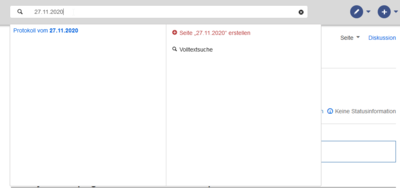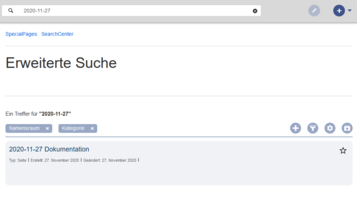ExtendedSearch replaces the default MediaWiki search engine. It is based on the Elasticsearch engine and provides many improvements over standard MediaWiki search both in terms of quality of indexed content and user interface. Pages and files are indexed immediately and available for searching in real-time.
Usage[edit | edit source]
Extended search offers two ways of searching for content:
- Title search using the Quick search
- Fulltext search using the Search center
By default, the search indexes:
- wiki pages: all content pages, except for pages in the MediaWiki namespace
- special pages: all pages in the namespace Special
- repo files: files uploaded to the wiki - for text files like Word documents and PDFs, this includes content and metadata
- external files: files from arbitrary locations from accessible storage paths (e.g., mounted drives)
- social entities: entities (=pages) created by the BlueSpiceSocial extension, such as blog posts and user profiles
Quick search[edit | edit source]
Recently viewed[edit | edit source]
When you place the cursor in the search field, it returns a list of pages that you have found and accessed through a recent search. Any suggested pages that you are not interested in, you can remove from this view by clicking on the x to the right of the page name. Once you start typing, the default suggestions disappear.
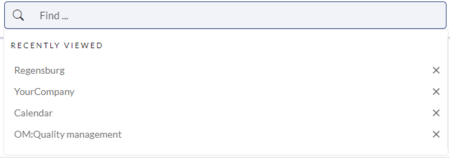
Title search[edit | edit source]
The search box is available on any wiki page and allows you to quickly jump to a wiki page. This search uses an auto-complete mechanism and matches only page and file titles. After typing some characters in the search bar, up to 7 search results appear. Based on the last edit date and the best title match, the search returns the found pages and files.
Please note: The wiki does not do a "fuzzy search" to try to understand what you are looking for. Spelling mistakes ("qualty" instead of "quality" will result in 0 matches).
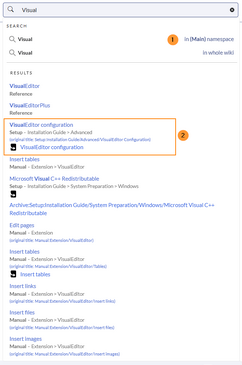
Namespace and subpage "pills"[edit | edit source]
The search bar supports so-called filter pills for namespaces and subpages.

If a user types Manual:and clicks "Enter", a pill for the namespace "Manual" appears and the search for the following term is limited to this namespace. .
Subpage pills work in the same way. If the user types in PageName/, any term after that is matched in the context of that page. If you search for "TestPage/Te", for example, the search will match only subpages of "TestPage" that contain "Te" in the title, like "TestPage/Test" and "TestPage/TestSubpage".
Dates as search terms[edit | edit source]
The search recognizes certain date formats. In the search center, these date formats are treated with surrounding quotation marks.
Search Center (extended search)[edit | edit source]
As soon as you trigger the full-search with the magnifying glass symbol or the Enter key, the wiki switches to the Search Center. This is a special page that offers the full functionality of the search. The search in the Search Center is carried out using the same search bar that is also used for autocomplete.
Here, the search engine carries out a full text search, which also includes the metadata of documents. It does not index the wikitext of a wiki page, but rather the rendered content, that is the output by the browser.
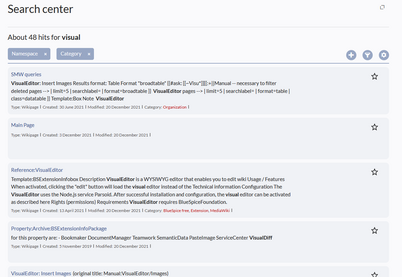
Search operators[edit | edit source]
Search operators have to be written in all-caps.
AND[edit | edit source]
admin AND docu: Returns pages that contain the exact termadminas well as the exact termdocuadmin* AND docu: If the termadministrationshould be found, you need to provide a wildcard asterisk (*).
Compare: The search admin docu automatically is a wildcard search. It returns pages that contain both admin* and docu* . This search normally finds more results than the serach admin* AND docu (because in the second case, the exact term docu is returned).
" (apostrophes)[edit | edit source]
Apostrophes around a search term triggers an AND search for all terms in the query:
"admin" docu: same result asadmin AND docu(i.e., also the precise termdocuwill be searched).
NOT[edit | edit source]
admin* NOT docu*: Returns pages that contain words that start withadmin, but that don't contain words that start withdocu.
OR[edit | edit source]
admin OR docu: Returns pages that contain either the exact termadminor the exact termdocu.
* (wildcard)[edit | edit source]
admin*: Returns pages that contain words that begin withadmin.
Elements[edit | edit source]
- Hit count - shows how many matches a search has returned. It may be exact or approximate. Approximation is due to dynamic check for permissions to view each page in the results, some results may not be shown to the user with no adequate permissions event if it matches the search term.
- Tools - these are located in the top right as a set of buttons:
- Create a page - represented by a "plus" button - will create a page with current search term as a title (only visible if user has permission to create pages)
- Add filters - represented by a "funnel" icon - opens a dialog where users can select the type of filter to apply to the search.
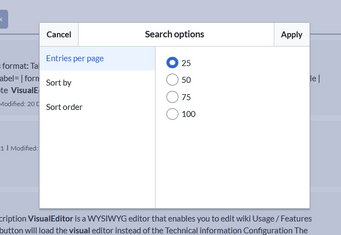
Adding filters - Search options - represented by a "gear" icon - opens a dialog where users can change settings for the current search. It provides options like the number of results per page, sorting field and order.
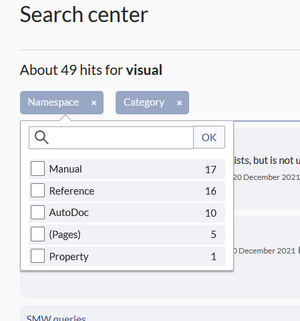
Options dialog - Export search - represented by the "export" icon - opens a dialog to export current search results to a dedicated page (only visible to authorized users, by default admin users).
- Filter: Filters are displayed in form of pills below the results counter. Each filter pill represents a different attribute. Filter values can be changed by clicking on the filter pill and selecting the desired options from the popup that will open. Filter can be removed by clicking on the "x" button in each pill.
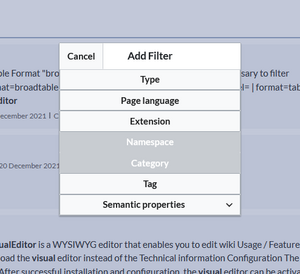
Editing filter - Results: If current search criteria field any results, a list of results is displayed. The information available in the results is depending on the result type):
- Main title of the result (page title, file name...)
- Result type
- Size and extension (for files)
- Thumb image (for images) or file type icon (for other file types)
- Redirect information
- Original name (for wikipages, if the page display title is different than the actual page title)
- Secondary information like page categories, modification and creation date, author, etc.
- Snippet of the matches in the content of the page (if there are matches in the page content),
- Sections with matches in the content (for wikipages)
In case there is an exact match for a given search term, the result that matches exactly is displayed as a "featured" result. Such a result displays a preview image of the page and always displays the content snippet, regardless of whether there are matches in the content or not.
Results relevance[edit | edit source]
All logged-in users can mark certain results as "favorites" by clicking on the star symbol in the right corner of each result. Files marked as "favorite" will score higher in future searches - this is not visible immediately, however, but happens over time. One user's relevance settings won't affect other user's searches. Results can be unmarked as "favorite" by clicking on the "star" symbol again.
Exporting search results[edit | edit source]
After executing the search, administrators can export (save) the results to a specific page using the "Export" command from the "Tools" menu. The list is exported to MediaWiki:PageCollection/LISTENNAME.
Only valid wikipages are exported. The pages contained in a list can be included in a book in the book function via Mass add> Source: Page collection.
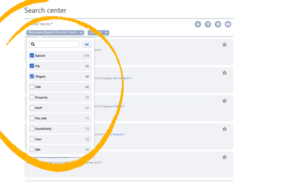
Configuration[edit | edit source]
In the BlueSpiceConfigManager, under settings for the extension BlueSpiceExtendedSearch, the following configuration options are available:
- External file paths: External locations to scan for and index files from. These locations are entered in key/value pairs of Physical path and URL prefix.
- Physical path: Storage path. For mounted drives, for example: X:\Documents
- URL prefix: All files indexed from the indexed physical location are prefixed in the search results. It should be used if files are available from a web server. By default, the URL prefix is set to the same value as Physical path.
| Example file | Phys. Path | URL Prefix | Link in results list |
|---|---|---|---|
| S:\Sales\Info\glossaryy.pdf | S:\ | file:///S:/ | file:///S:/Sales/Info/glossary.pdf |
| https://sharepoint/Sales/
documents/ |
https://sharepoint/Sales/
documents/Sales/Info/glossary.pdf | ||
| https://intranet/showdocs
inline.aspx?path= |
https://intranet/showdocsinline.aspx?
path=/Sales/Info/glossary.pdf | ||
| /var/www/bluespice/w/mounted_
share/Sales/Info/glossary.pdf |
/var/www/bluespice/w/
mounted_share/ |
https://wiki.company.local/w/mounted_
share/Sales/Info/glossary.pdf |
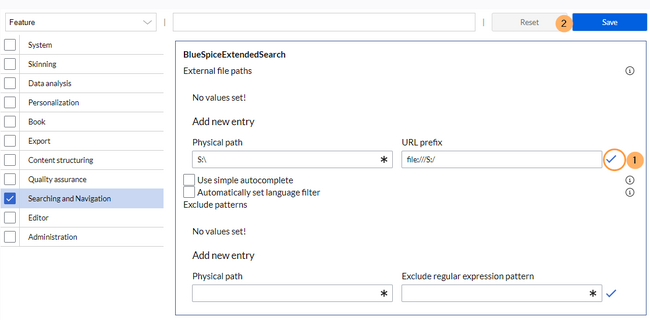
- Automatically set language filter: The search only returns pages whose language (PageLanguage) is identical to the user language (Language). Users can set their language in their preferences. By default, the language of content pages is the same as the installation language (ContentLanguage) of the wiki. Some extensions can set the language of individual pages independently of the content language of the wiki.. (See: https://www.mediawiki.org/wiki/Manual:Language#Page_content_language). In many wikis, activating this filter has little effect.
- Exclude patterns: Files at external file locations can be exluded from search based on regular expression patterns.
SearchAdmin[edit | edit source]
Special:SearchAdmin is a special page for wiki admins and shows the number and types of indexed documents.
